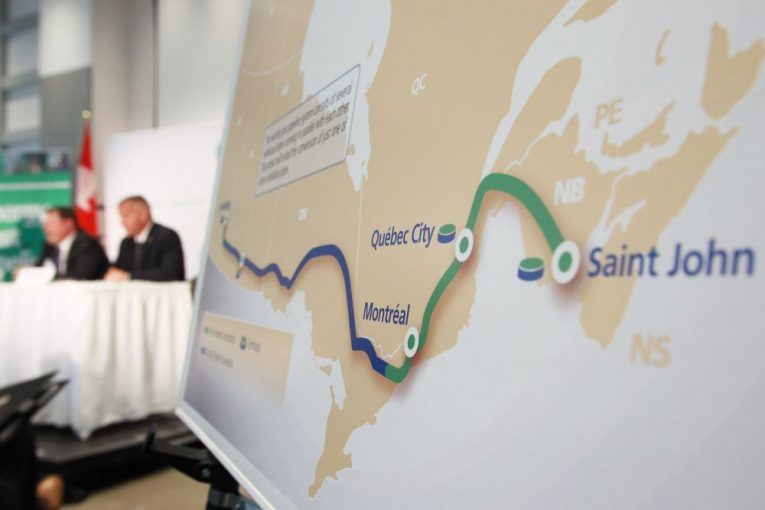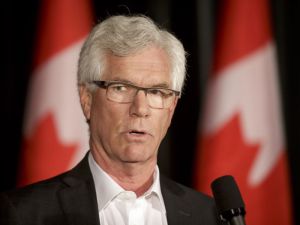
Federal government policies tying environmental impacts to regulatory approval of pipelines are sending investors fleeing for more certain ground, critics and pipeline proponents said Friday.
The comments come a day after TransCanada Corp., said it was asking the National Energy Board to suspend its application for the 4,500-kilometre Energy East pipeline between Alberta and New Brunswick for one month while it figures out if the NEB’s environmental assessment of the line will affect the economic argument for the project.
The NEB last month announced the outline of its new review process for Energy East and said for the first time the environmental assessment will include an examination of the greenhouse gas emissions created at all stages, from oil extraction to end use.
Canada West Foundation CEO Martha Hall Findlay, a former Liberal MP, said everyone wants to cut greenhouse emissions, but the government is not going to prove it can cut emissions and still build pipelines by “moving the goal posts in the middle of a major investment decision.”
Canada West Foundation CEO Martha Hall Findlay.
She said her organization is supportive of putting a price on carbon as a means to cut emissions, but using the regulatory process to try and do it as well is the wrong policy.
Assessing the upstream and downstream emissions will not “make or break” the Energy East project, but it adds one more layer of delay to a project that has already been riddled with them, she added.
TransCanada had to redo its NEB application after the first attempt was deemed too complicated and then last fall the first assessment was suddenly halted and then shut down after complaints about conflicts of interest for some of the people chosen to make the decision.
The new process is the one that now adds upstream and downstream emissions to the table and has taken an entire year to get going again.
“My guess is this is the straw that broke the camel’s back,” said Germain Belzile, a senior associate researcher at the Montreal Economic Institute.
Belzile said he is very skeptical TransCanada will ever restart its application unless there are some major changes to the NEB process in the next month.
“I think it proves that even if the federal government says (pipelines can be built sustainably) what they are doing is creating an environment in which it is almost impossible to get a project approved in a timely manner.” he said.
Prime Minister Justin Trudeau said any big project has to balance jobs and economic growth against protecting the environment.
“So it’s up to companies and proponents to figure out the best path forward, but I think taking time to reflect and making sure it gets done right ends up saving time and energy in the long run,” he told reporters during a stop at a festival in St-Tite, Que., on Friday.

Minister of Natural Resources Jim Car
Natural Resources Minister Jim Carr was not available to speak about the issue Friday. He was in his Winnipeg constituency office, where he had a pre-scheduled meeting with NEB head Peter Watson.
The meeting was not intended to deal with Energy East but the matter was discussed briefly, a federal source said.
Carr is expected to unveil his government’s overhaul of the regulatory process, including environmental assessments, later this fall.
His spokesman, Alexandre Deslongchamps, said in a statement TransCanada’s decision is its own to make, but didn’t respond when asked whether Ottawa will reconsider the upcoming assessment plan in lieu of the decision to put the project on hold.
Last November, the Trudeau government approved two pipeline expansions to Enbridge’s Line 3 and Kinder Morgan’s Trans Mountain line. Construction began in August on the Line 3 expansion between Alberta and Wisconsin, but opposition to Trans Mountain from First Nations and the new B.C. government make its completion uncertain.
Conservative natural resources critic Shannon Stubbs says Liberal energy policies are scaring investors and putting national unity at risk.
She added the government’s policies have led to a drop in investment in the energy sector in the last two years, which she says is the equivalent of losing three-quarters of Ontario’s auto manufacturing industry and all of Quebec’s aerospace industry.
“Rightfully that would be a national crisis,” said Stubbs. “We think the federal government should make the energy sector, the long-term viability and sustainability of the sector, and oil and gas workers a priority.”
-follow @mrabson on Twitter.
You can read more of the news on source
